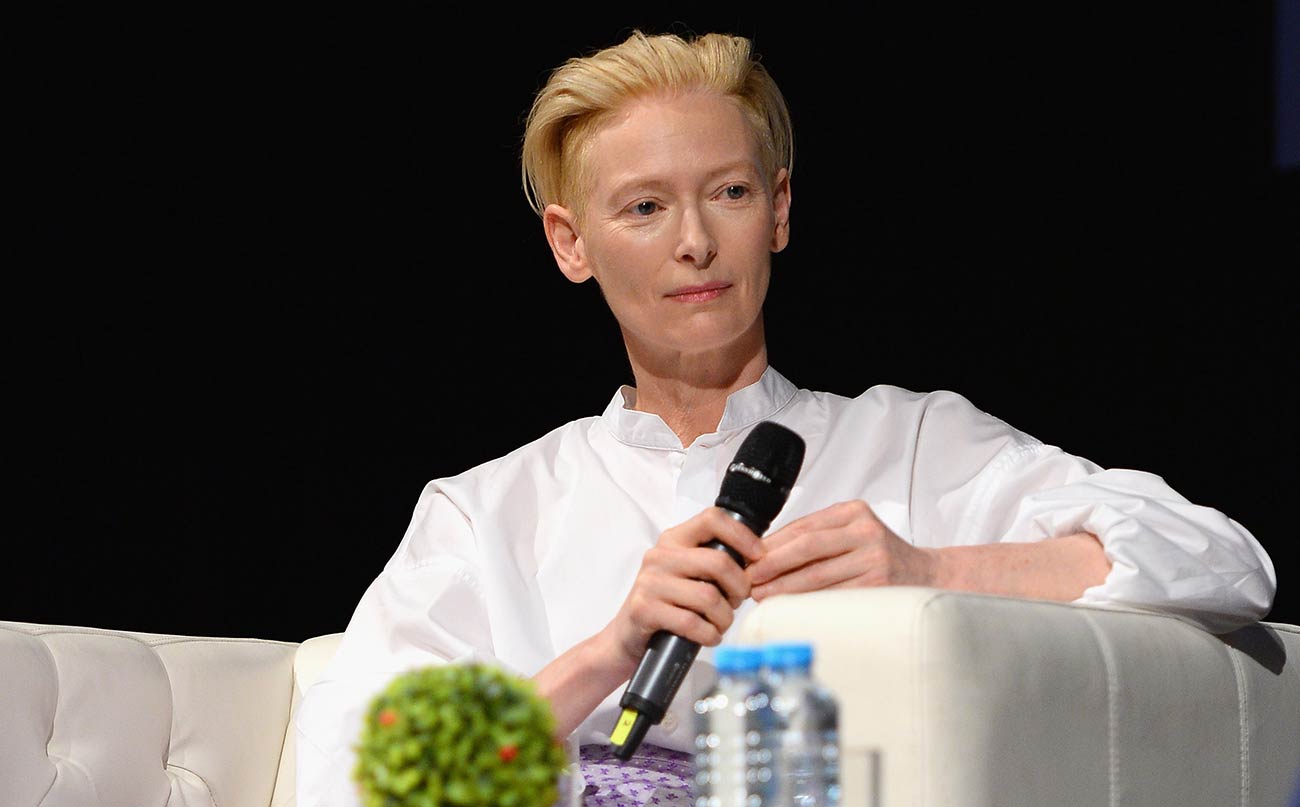Now celebrating its fourth year, Qumra is a weeklong industry event run by the Doha Film Institute in Qatar. We’ll be bringing you coverage of the stellar lineup of Qumra 2018 Masterclasses, given by such luminaries as Tilda Swinton, Apichatpong Weerasethakul, Andrey Zvyaginstev, Bennett Miller and Sandy Powell, in the coming days.
Of all the identities we regularly project onto the shimmering set of alabaster surfaces we collectively call “Tilda Swinton” — immortal vampire, avenging angel, White Witch, earthbound heir to the androgynous-alien-envoy legacy of David Bowie — the very least expected one might be “good egg.” But in her scintillating Qumra Masterclass, held in the cool of a museum auditorium out of the baking heat of the Qatari capital, Doha, she proved herself to be exactly that — an articulate, engaged, self-aware interviewee who responded to moderator Cameron Bailey‘s thoughtful, dexterous questions with down-to-earth candor and wit.
Her persona might be one of ethereality and otherworldliness — and with her tall, angular blondeness here clad in a white blouse and long, light-pink crinkly taffeta skirt, at first glance it was only the stilettos that interrupted the general Victorian ghost vibe. But in person she is warm and lively, and exactly the sort of inspirational, frank “master” whose insights could galvanize the aspiring filmmakers who make up most of the audience here.
These extremely enjoyable two hours were interspersed with clips from Jim Jarmusch‘s “Only Lovers Left Alive,” Sally Potter‘s “Orlando,” Tony Gilroy’s “Michael Clayton” (for which Swinton won her Oscar), Lynne Ramsay‘s “We Need to Talk About Kevin,” Bong Joon-Ho‘s “Okja“ and Andrew Adamson‘s “The Chronicles of Narnia: The Lion, The Witch and the Wardrobe.” Here are just some of the highlights.
 Oscar-winning actor Tilda Swinton is not an actor.
Oscar-winning actor Tilda Swinton is not an actor.
Several times throughout the talk, she maintains, always with a slight “don’t hate me for saying this” grimace, that she has never considered herself an actor, rather she’s a person who gets “constantly distracted by these amazing conversations I have with my friends that lure me back.”
“I never intended to be on the screen, and honestly I never do,” she says, “Every film I make I intend to be the last. I have other stuff to do that I’m not getting on with! This may sound flippant but it’s really sincere: I have never thought of myself as an actor, I still don’t think of myself as an actor and I certainly don’t intend to become one.”
Later she returns to the theme, “When I say [that] I’m sure people raise their eyes to heaven and say, ‘what’s she talking about?’ because I’ve been doing it for over 30 years. But what I mean is, I hear real actors speak — they’re people who have trained, people who really care about acting, who are prepared to talk about it, who are able to focus on the craft in some kind of isolation, outside of the filmmaking. I’m much too interested in filmmaking to be that interested in acting… It sounds so trite but it’s true — think of me as a glorified member of the art department.”
That said, she was in the Royal Shakespeare Company…
“…for about a minute,” says Swinton, immediately following it with “And it was great because it’s always good to learn what you don’t want to do. I always knew I wasn’t an “interpreter.” I hope this isn’t too pretentious, but performing is a way of me being an author — an author in collaboration. When I write, I write alone. But when I make films, I make films in conversation with filmmakers.”
 The first person to strike up that “conversation” with her, was British filmmaker Derek Jarman (“Such an extraordinary example of self-determination as an artist”) with whom she made seven films.
The first person to strike up that “conversation” with her, was British filmmaker Derek Jarman (“Such an extraordinary example of self-determination as an artist”) with whom she made seven films.
“Art was something people owned, it wasn’t something people made,” Swinton says of her upbringing in a military family. “But I became an artist in conversation with Derek. We worked in this pre-industrial, completely ramshackle way, which had nothing to do with acting, nothing to do with any kind of ‘idea of oneself onscreen.'”
She did, however, develop a recognizable tic of her own.
“I think not knowing is great training. Ignorance is bliss. For a long time, for several years, pretty much every film I made I wanted to look into the camera. On the first film I made with Jarman, ‘Caravaggio,’ I play this ragamuffin character whose hair is always up in a scarf and there’s this one moment where [mimes a flourish] she takes it off. And I think I felt, as a young woman, a little twinge of being exposed, of being looked at too much. And I asked him if I could look in the camera, and he of course, being Derek, said yes. And so I established this habit of always looking in the camera. It really helped me to feel that I was present, that I was making it, not having it made on me.”
“[To look at the camera] breaks something which I didn’t want in the first place. The last performance I made in the theater was a one-woman show when I was talking to the audience and I loved it so much. But it ruined theater for me because I didn’t think I could ever go back to [pulls comically awkward sideways face] pretending I was in a drawing room ignoring everyone over there. It is a powerful thing. I mean we’ve all seen films where some extra keeps looking into the camera, and you don’t see anything else that’s going on — forget the elephants! — all you see is the extra.”





